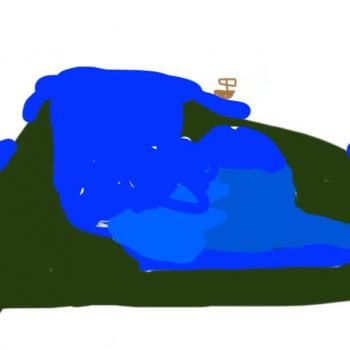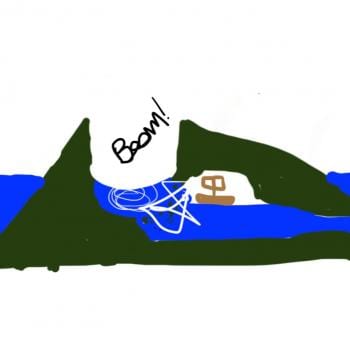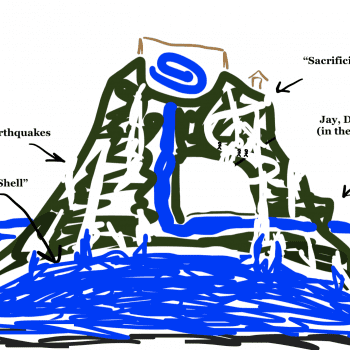The Island of Aquarius, pp. 7-16
Last week we finished up Door in the Dragon’s Throat. Generally, after finishing one book I’ve gone on to another, unrelated book. Several readers have asked me to keep going with the Cooper Kids Adventure Series, however, and it just so happens that I have a copy of book 2: Escape from the Island of Aquarius. I skimmed it last week, the first time I’d read it since I was a teen. I found it sufficiently different from book 1 to be interesting without being boring, while also hitting on many of the same ridiculous sort of themes we all commented on and loved in the first book.
My plan is to power through this quickly with more description and less quoting if it ends sup getting boring. This book is about the hippies, by the way. In Polynesia. Cult hippies. Oh yes! Buckle up!
Here’s how the book begins:
It was a hot, clear day on the South Pacific, and the ocean had that slow, lazy feel that could rock you to sleep with its gently rolling swells. The captain of the chugging trawler was bored and playing checkers with his first mate while another crewman stayed at the ship’s wheel. There wasn’t much to talk about, so nobody did much talking. They had hauled their catch and were headed for port, and that was all that really mattered.
Um, okay.
Who is this captain? Who captains fishing boats on the south pacific? Does playing checkers mean they’re Americans, or do Polynesian fishermen play checkers? If they’re Americans, though, they’re pirate Americans.
The crewman at the wheel calls out that he sees something off the port bow, and for everyone to come see. The captain says he’s already seen everything, so he’s not coming. Oh, no no no, they insist! You haven’t seen this!
“I’ll wager I have,” said the captain, getting up from the checker game, “and now I’ll see it one more time, and you’ll not be at any advantage for being away from our game, mark my words! I’ve—“
I mean really, what is that?
They see a hobbled together raft with a man tied to the mast, in case you’re wondering.
A ladder was lowered over the side, and two crewmen clambered down it. They dangled from the ladder by one hand and one leg and let the blue-green, foaming water pass slowly under them.
I mean … okay.
They get onto the raft and find that the man is dead—and that he’s wearing a heavy copper medallion.
It bore a symbol of the zodiac.
“Aquarius,” said the capitan.
This is local lore, apparently, and it doesn’t make any sense. Aquarius is a place, and the captain says he “wagers” it wasn’t the sea that killed this man—“it could have been a curse … or a spirit … something dark, and altogether unkind.” Okay then. This is part of why I wish we knew more about this fishing boat and its crew. Where have they heard these stories from? How widespread are these stories, and for how long have they been going around?
Nothing about this story of a curse makes any sense.
They check the man’ pockets and find a letter. They make out the words “International Missionary Alliance” and “Adam MacKenzie” and decide they’ll take the man to Samoa and “let the the powers-that-be have their talk with these missionary people.” And that’s that. The end of our nice little introduction.
Scene change! Enter Dr. Cooper and kids!
Dr. Jake Cooper sat in the back of the little cruiser as it putt-putted across the blue water, his sharp eyes constantly checking the horizon and then referring to the map laid out in front of him.
Did he have a first name in the first book? I actually don’t think he did.
His fourteen-year-old son, Jay, kept a strong and steady hand not eh helm and his eyes on the boat’s compass.
Having characters named Jay and Jake sounds like a great idea. Maybe it’s a good thing Peretti always refers to him as Dr. Cooper.
“Well, Dad,” he said, looking again to be sure, “I still don’t see any island out there.”
Jay’s sister, Lila, thirteen, sat on a cushion to one side, her head hanging over the rail, her blond hair hanging over her glazed eyes.
“Land … land …” she pleaded.
Oh FFS.
Several readers noted in the last book that Jay is the active, bold, adventurous one while Lila is frequently portrayed as being scared or worried. They were not imagining that, and we’re already seeing it here. Lila is seasick. For those who were curious, there’s no way this is accidental. Or rather, it may be unintentional, but everything Peretti writes in these books is filtered through his evangelical Christian beliefs about people—and about gender—so it’s not accidental.
As we listen in on the conversation between the three we learn that they’ve been island hopping, looking for Aquarius.
“We’ve been to twenty different islands now and nobody we’ve talked to has even heard of an island called Aquarius.”
“Not by the name, no,” Dr. Cooper answered, peering across the water through the binoculars. “But all the natives and tribes around here seem to know the rumors about some island that is taboo, or cursed, or evil. The very fact that they refuse to talk about it is strong evidence for its existence.”
Whaaaat.
This is like the satanic panic, when the fact that a child didn’t allege horrible things about their daycare teacher could be viewed as evidence that their daycare teacher did horrible things—because why else would the child be too scared to talk about it?! Also, did they actually refuse to talk about it, or did they tell him about rumors about a cursed island? Either they didn’t talk about it, or they told him about rumors they’d heard. I don’t see how it can be both.
Also, does Dr. Cooper know the local languages? He’s not traveling with a guide. Actually, that may be the weirdest thing here—it’s literally just the three of them, out in the pacific in some kind of boat, completely and totally alone. How are they sure they won’t get lost? How does Dr. Cooper know how to pilot a boat? From what we’ve heard, he typically does archeological digs in places like Egypt or mythical countries in the Middle East. Biblical archeology—which is what he does—doesn’t exactly involve a whole lot of boating experience.
Look, all I’m saying is that if I went to the South Pacific, I’d sure as heck go with a guide, someone who knew the area and the language and the weather and boats and tides and all the other things that’d quickly get me into trouble.
So, here’s the thing about Lila. She’s the one who’s always scared or nervous or sick, but she’s also the only one who even remotely has her head on her shoulders.
“All this over a little note,” she muttered sickly.
“Well, said Dr. Cooper, the International Missionary Alliance seemed to think that little note was a vital link too MacKenzie. He disappeared in this area and was assumed dead over two years ago, rememberers,r but now this note turns up in the pocket of a dead man, and the handwriting is definitely MacKenzie’s.”
“Which means he could still be alive somewhere,” said Jay.
“But why did the Alliance hire us to find him?” Lila wondered.
See what I mean? She’s asking the hard questions!
Dr. Cooper immediately starts insisting that they’ve been hired for very good reasons—because no one else wanted to do it, and because the man’s death was definitely not normal—that kind of thing.
“I talked to the authorities in Samoa, but all they could give me was guesses about poisons and rumors about Aquarius, and that medallion around his neck. I’m afraid we’ll have to find out everything for ourselves.”
“I thought we were archaeologists,” Lila said.
Ding ding ding! I thought so too!
Only Jay says anything in response: “We’re also very good at snooping.”
Also, I am not an expert on the zodiac—I really know nothing at all—but I did some googling just now and I what I learned suggests that it definitely doesn’t have anything to do with the South Pacific. This makes no sense.
Finally, they spot an island. Aquarius!
“Are there any rumors about this island eating boats?” Lila asked.
“No, just people,” said her father. “They say that no one ever returns from here.”
I just. I can’t with this.
I’ll go ahead and spoil something—this island is inhabited by hippies. They’re mostly Americans, but they’ve absorbed the local native population. When did these rumors start? In the past couple of years, after the hippies arrived and started their weird cult? Or earlier, when it was just natives living on the island? And why?
This curse is never, ever explained.
But don’t worry—this isn’t the only curses. There will be other curses, too, some of which will be explained. Just not this one.
As they approach the island they notice something weird.
“I guess everything’s normal enough,” Lila said very softly.
She felt Dr. Cooper’s gentle hand on her shoulder.
“Maybe not,” he said quietly, pointing. “Look at those palms over there, that whole grove.”
The three looked. Over to one side of the cove, now silhouetted against the red sky, a very large grove of palm trees grew out of the ocean, as if swamped by a very high tide. But there was no high tide.
How do they know there’s no high tide? Dr. Cooper is not an expert on the South Pacific. This is one reason bringing a guide along might have been helpful—a guide could have told them whether this was normal. I’ll go ahead and spoil it for you, though: as it will turn out, the island is sinking. The whole damn island. Awesome!
Is the sinking island the curse? Do people know this is going on, or there are rumors? What about the statement that no one ever comes back from the island? Where does that story come from? Is that recent, or is that something that was also going on before the hippie cult arrived at the island? (I’m assuming the cult is behind the story of no one returning from the island? If it is, that would definitely make this story’s origin recent.)
Anyway, as the Coopers watch the island they notice something odd—a rustling and cracking and movement on the island. Finally a person pokes a head out from among the leaves.
A face!
It was like a fight mask in some carnival fun house; with wide and wild eyes, a gray, straggling beard, and jagged teeth that glistened in the beam of the spotlight.
The thing, or creature, or person, jumped out of the bushes and began to wave its skinny arms, hollering, “No! Go away! Go away, you!”
They call out to the figure, but with that he’s gone—and then they see something else.
A light was moving through the jungle, coming their way.
What could it be?
The light bobbed steadily toward them, blinking behind the trees, branches, and bushes. Finally it broke into the open and moved along the shore, floating about seven feet above the ground.
“Is … is that—” Jay began to ask.
“Yes,” said Dr. Cooper, peering into the darkness. “I believe it’s exactly what it looks like.”
“How does he do that?” Lila asked.
The light was from some kind of torch, which rested on, or rather was stuck to, the top of a very tall Polynesian’s bald head. The man stood on the shore looking at them, a scowl on his dark face, his arms at his sides, his body straight and clothed in skins, bones and grass. He looked like a tall, muscular candle.
What.
I googled “Polynesian torch on head” and the only relevant image I found was this. And that image is only relevant because it’s a picture of a Polynesian man dressed in western style clothing, not skins, bones, and grass, wearing on his head not a literal torch but a helmet with a flashlight mounted on top. The image credits say he’s night fishing.
Tweaking the search terms, I also found images from the World Fireknife Championship at the Polynesian Cultural Center in Hawaii:

This looks like a fascinating competition and a beautiful cultural tradition—and I’ve heard great things about the Polynesian Cultural Center in Hawaii—but this is also not what Peretti is describing in his book.
Peretti showed in his last book that he is more than capable of a truly wild level of racism. While it is in theory possible that mounting a lit torch on one’s head was or is a thing somewhere in the South Pacific, I feel like it’s more likely that this was an invention by Peretti. It’s also possible that this was misinformation Peretti heard somewhere and believed without checking, because Polynesians aren’t like you or me—they’re exotic and different.
I’m sitting here trying to figure out how this would even work. Having a lit torch mounted on one’s head feels dangerous. How is it stuck there? Peretti doesn’t mention any apparatus it’s mounted on, stating instead that the torch “rested on, or rather was stuck to” the top of the man’s head. What does that even mean? Wouldn’t there be sparks?
The Polynesian’s deep voice boomed across the still water. “You! Who you?”
They call back that they’re the Coopers from America, and add that they’re looking for ” a missionary named Adam MacKenzie.”
The big man fired some unintelligible native words at them, his big arms waving like a windmill. He closed with, “Come! Come plenty now, don’t be afraid!”
“Well…” Dr. Cooper said quietly to Jay and Lila, “he’s civilized to the extent of some English.”
Yup. There it is. The man is “civilized to the extent of some English.” If a book like this uses the word civilized, you can be pretty sure it’s racist. Yup. So very. Very racist. Not okay.
So, anyway:
“In other words, we’re going ashore,” said Jay.
We’ll carry standard provisions,” Dr. Cooper instructed. “I don’t plan to be away from the boat for very long, especially with all the explosives we have on board.”
Whaaaat.
“Jay,” asked Lila teasingly, “just why did you bring all that blasting equipment along? This isn’t an archeological dig, it’s a weird little island.”
Jay shrugged. “Ehhh, force of habit, I guess.”
“Maybe we’ll need to open some coconuts,” said Dr. Cooper.
Oh. Boy.
You guys. What’s with the explosives?
They all laughed together at that and gathered their gear together while the big torchman on the beach stood and watched.
Big. Torchman.
If it makes y’all feel any better, the big torchman gets the last laugh.
Next week, we meet the hippie cult.
I have a Patreon! Please support my writing!















